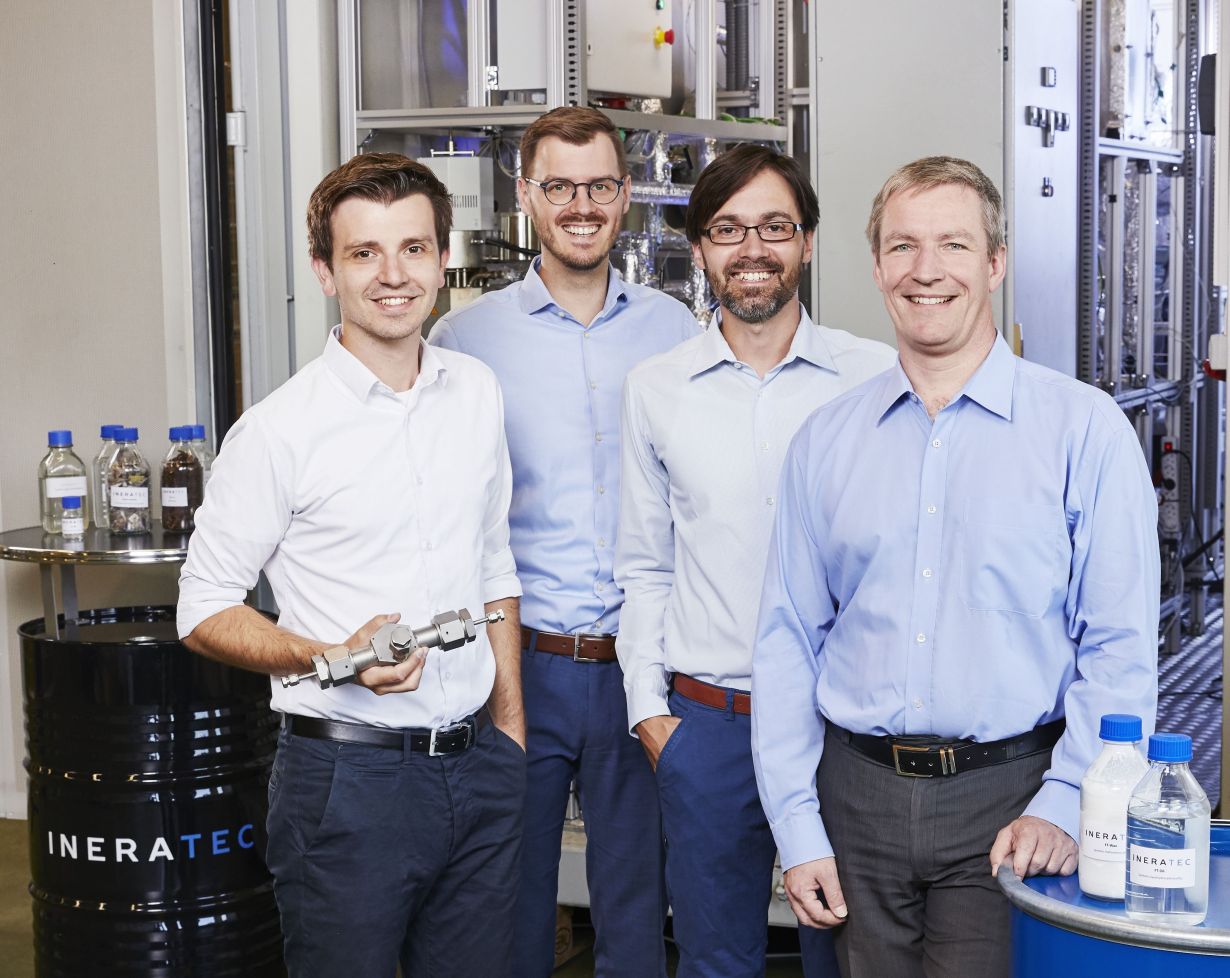Inexpensive production of synthetic fuels from renewable energy sources is an important element of the energy transition. Production of synthetic gasoline, kerosene, diesel or natural gas, however, requires very large facilities. Ineratec, a spinoff of Karlsruhe Institute of Technology (KIT), has managed to shrink chemical reactors down to a compact format that fits into a ship container and can be used at any location. For this, the startup was granted the German Entrepreneur Award 2018 in Berlin.
“Synthetic fuels are an important step towards a closed CO2 cycle,” says the President of KIT, Professor Holger Hanselka. “With climate change and the energy transition, KIT does not only tackle two of the most urgent problems of society, regenerative fuels may also open up entirely new fields of business along the chain of values added in the future. Ineratec is an excellent example.”
“Transferring scientific findings to applications from which industry and society can profit is one of the core tasks of KIT,” says Professor Thomas Hirth, KIT Vice President for Innovation and International Affairs. Hence, KIT supports entrepreneurial thinking and acting in many ways, by funding startups of students and researchers, by making available office and laboratory areas in innovation hubs, or by providing advice and establishing networks. “This innovation culture is reflected by constantly good results in rankings on the support of startups and this German Entrepreneur Award.”
“Chemical processes to produce synthetic natural gas or synthetic fuels from the climate killer CO2 and regenerative hydrogen usually require extremely expensive and large chemical facilities,” Tim Böltken, Managing Director of Ineratec GmbH, says. The Interatec founders did not only manage to shrink these large chemical plants down to the miniaturized format, the energy required for the production process may also be produced from regenerative sources, such as solar, wind or water power. “In this way, it is stored in chemical energy carriers,” the alumnus of KIT explains. The pre-mounted, compact plants are modular and can be extended to increase capacity anytime.
Several plants are in operation already: a power-to-liquid plant that produces renewable liquid fuels and is suited for mobile use was sold to Finland. In the city of Sabadell, Catalonia, a power-to-gas plant produces synthetic methane gas from sewage sludge-based carbon dioxide. This methane gas is planned to be directly fed into the Spanish grid. At KIT, where the Energy Lab 2.0, a complex of different plants, is presently being established to test the use of various technologies for the production and consumption of electrical, thermal, and chemical energy, Ineratec is setting up a pilot plant for the production of renewable kerosene from carbon dioxide and hydrogen.

The pre-mounted compact chemical plants fit into a ship container. (Photo: Ineratec/Hauser)
Among the three finalists for the German Entrepreneur Award was another KIT alumnus: Florian Wehner’s company Vectoflow produces 3D-printed probes applied in Formula 1 motorsports. Racing teams, airplane manufacturers, aviation companies – they all need to know air flow and its direction. Vectoflow supplies probes adapted to the individual needs of customers. They precisely measure the flow of air, water, or oil. Every Formula 1 car is equipped with a probe that measures the speed and direction of air flow during the race. Some of them were developed by Vectoflow. Before he established his company, Florian Wehner studied mechanical engineering at KIT and specialized in product development and lightweight construction. He also joined the university group KA-RaceIng, the formula student team of KIT that designs several racing cars every year.
The German Entrepreneur Award is presented annually to entrepreneurs setting up new businesses and creating innovative and viable business ideas at the main studio of Germany’s national public television broadcaster ZDF in Berlin. The candidates are proposed by a network of experts and then have to convince a jury of their companies in several rounds. The winners of Germany’s most prestigious acknowledgement of entrepreneurial excellence are offered consultancy and sponsorship by experienced entrepreneurs.
In close partnership with society, KIT develops solutions for urgent challenges – from climate change, energy transition and sustainable use of natural resources to artificial intelligence, sovereignty and an aging population. As The University in the Helmholtz Association, KIT unites scientific excellence from insight to application-driven research under one roof – and is thus in a unique position to drive this transformation. As a University of Excellence, KIT offers its more than 10,000 employees and 22,800 students outstanding opportunities to shape a sustainable and resilient future. KIT – Science for Impact.

